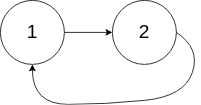LinkedList - 142. Linked List Cycle II
- Linked List Cycle II
Given a linked list, return the node where the cycle begins. If there is no cycle, return null.
To represent a cycle in the given linked list, we use an integer pos which represents the position (0-indexed) in the linked list where tail connects to. If pos is -1, then there is no cycle in the linked list.
Note: Do not modify the linked list.
Example 1:
Input: head = [3,2,0,-4], pos = 1
Output: tail connects to node index 1
Explanation: There is a cycle in the linked list, where tail connects to the second node.

Example 2:
Input: head = [1,2], pos = 0
Output: tail connects to node index 0
Explanation: There is a cycle in the linked list, where tail connects to the first node.

Example 3:
Input: head = [1], pos = -1
Output: no cycle
Explanation: There is no cycle in the linked list.

Follow-up:
Can you solve it without using extra space?
思路:
题目是让找到环的起点,做法就是用快慢指针,开始的时候,两个指针都从head出发,然后快指针走两步,慢指针一次走一步,相遇就说明有环,这个时候,再用慢指针从链表头开始走,快指针变成走一步,这样两个指针再次相遇的地方就是环的入口。
详细解释一下推算过程:
假设链表头到环到起点距离是L, 环的长度是S, 快指针一次走两步, 走的长度是2F,慢指针一次走一步,相遇的时候走的长度是F,假设第一次相遇地点距离环起点是U,相遇时候,快指针在环内走了k圈。
那么
L + k * S + (S - U) = 2(L + (S - U))
也就是
L = (k - 1) * S + U, (U <= S)
所以存在一个点,能够让相同速度的两个指针各自走完L和U,然后刚好相遇。
代码:
java:
/**
* Definition for singly-linked list.
* class ListNode {
* int val;
* ListNode next;
* ListNode(int x) {
* val = x;
* next = null;
* }
* }
*/
public class Solution {
public ListNode detectCycle(ListNode head) {
if (head == null || head.next == null) return null;
ListNode slow = head;
ListNode fast = head;
while (fast != null && fast.next != null) {
slow = slow.next;
fast = fast.next.next;
if (fast == slow) {
while (head != fast) {
fast = fast.next;
head = head.next;
}
return head;
}
}
return null;
}
}
go:
/**
* Definition for singly-linked list.
* type ListNode struct {
* Val int
* Next *ListNode
* }
*/
func detectCycle(head *ListNode) *ListNode {
var (
res *ListNode
slow = head
fast = head
)
if head == nil || head.Next == nil {
return res
}
for fast != nil && fast.Next != nil {
slow = slow.Next
fast = fast.Next.Next
if slow == fast {
fast = head
for slow != fast {
slow = slow.Next
fast = fast.Next
}
return slow
}
}
return res
}